
On Nov. 17, one of Korea’s biggest exams, the College Scholastic Ability Test (CSAT), took place. Most students must go through it to enroll in the universities they want, and it involves keen competition for good grades. Many people had gone through this course, and the CSAT makes the headlines every year. As many as about 500,000 students took the CSAT this year, in just nine hours as well.
These days, experts are increasingly criticizing this examination system. In addition, as participants decrease compared to over 800,000 students in earlier CSAT’s, grade evaluation systems have encountered a wall. Many people, including me, think that the educational structure which mainly focuses on the CSAT should be changed.
My first week of high school was full of teachers’ advice about how significant college entrance was. All students had to spend about or more than 10 hours in school and go to private institutes following their regular classes, under the CSAT-oriented system. It requires constant multiple-choice testing and students’ academic abilities are divided into nine-different classes.
We should really consider again whether this is the correct way. It is wrong that so many teenagers struggle and feel nervousness within their hearts, to achieve the same goals. They think getting good grades on exams and entering a high-level college is directly connected to social success. This interferes with them finding what they are truly interested in and developing suitable careers.
Students who get satisfactory scores may feel a heightened sense of accomplishment as they endure this process. Even, this makes them haughty and unaware of the essence of education. On the other hand, those with low scores relative to their surroundings might feel extremely depressed. This is because the CSAT has naturally made a winner-take-all system according to ranking. Due to these result-oriented evaluation methods, many people look only at the results and nothing else.
Of course, getting good grades can be related to life success. But the result of an exam is not all in life and life is a combination of numerous variables. Educators should prepare various chances for achievement and make teenagers learn in the process of studying. It does not mean that exams including the CSAT should be abolished, but it means schools should focus on a way for students to study contentedly. They are not glad to get high scores, but rather worried that their score will drop in the next exam. I hope students don’t worry about their grades too much and find happiness in studying itself.
Someone may say Korea’s students are so passionate that competitions today have been formed naturally. However, we must consider whether education corners them to the edge of the struggle. Accordingly, Korea’s schooling system needs to recognize diversity and encourage students grow into a wide range of fields, not competing to end up at the top of the pile. I believe a small change in education will cause a considerable transition in our society where ranking prevails.
Finally, a more important thing is life after the CSAT. I thought that everything would be over when the exam finished. But there is another starting point waiting for us whether we enter a university or another area of society. Teenagers must prepare for it, and deeply think about what they want to pursue and accomplish. Education today must pay attention to supporting students’ paths and leading them to an independent life regardless of the outcome. I wish students to feel pleasure in learning and not to suffer from fixed answers.


